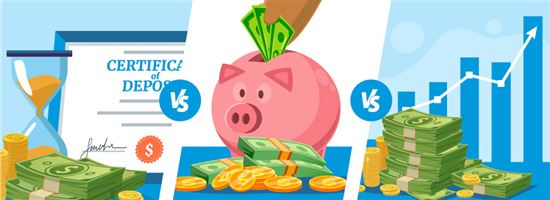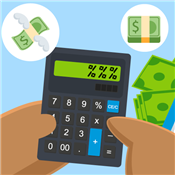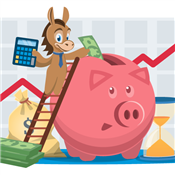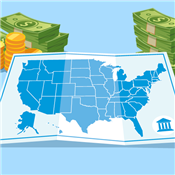CD vs Savings vs Money Market
Ad Disclosure: This article contains references to products from our partners. We may receive compensation if you apply or shop through links in our content. This compensation may impact how and where products appear on this site. You help support CreditDonkey by using our links.
CDs, savings, and money market accounts can all help you grow your money over time. But which one is right for you?
 |
Picture this scenario: You're looking to put money away for future savings. While looking for an account, you bump into savings accounts, certificates of deposit (CDs), and money market accounts.
What's the difference? How do you know which one is best for you? It can be a little confusing, so read on for everything you need to know.
Which one Is best for you?
- Savings accounts are great for short-term plans like vacations or emergency funds. This is because funds stored in savings accounts are easily accessible.
- Money market accounts are similar to savings accounts, but they could come with more features like ATM cards and check-writing abilities (depending on the bank). It's good if you want more versatility.
- CDs are great for long-term goals. You lock away your money for a fixed term, so it's good if you know you won't need the money any time soon. In exchange, they often offer higher interest rates.
| Savings | Money Market | CD | |
|---|---|---|---|
| FDIC/NCUA Insurance | Yes | Yes | Yes |
| Checkwriting | No | Maybe | No |
| Debit/ATM Card | Maybe | Maybe | No |
| Liquidity | Yes | Yes | No |
| Transactions | Usually 6/mo | Usually 6/mo | None |
| APY | High | High | High |
Generally, savings, money market, and CD accounts are all safe as long as they're FDIC or NCUA insured.
What Is a Savings Account?
A savings account is a place to store your money, usually offering interest to help your money grow. It's designed to help you store funds easily while keeping the money super accessible in the case of an emergency.
Interest rate for savings accounts is variable, and could be subject to change at any time. So you could open an account, and the rate could go up and down. Online saving accounts usually offer the highest interest rates.
The drawback to a savings account is that they usually have withdrawal limits (since the point is to save money). Federal Reserve Regulation D limits savings accounts to 6 transfers or withdrawals per statement cycle.[1] Additional withdrawals could incur fees.
Some savings accounts may require you to make an opening deposit or keep a minimum balance in order to waive a monthly fee. But that'll depend on the bank you choose.
Often referred to as a high-interest account, a high-yield savings account is a type of savings account that offers better-than-average interest rates.
|
|
CIT Bank Platinum Savings - 3.75% APY
- 3.75% APY with a balance of $5,000 or more
- 0.25% APY with a balance of less than $5,000
- $100 minimum opening deposit
- No monthly maintenance fee
- Member FDIC
UFB Portfolio Savings - Earn up to 3.26% APY
- Earn up to 3.26% APY.*
- No monthly maintenance fees.
- No minimum deposit required to open an account.
- Access your funds 24/7 with easy-to-use digital banking tools.
- Enjoy peace of mind with FDIC insurance up to the maximum allowance limit – Certificate #35546.
High-Yield Savings Premier - 3.80% APY
- No account fees
- Option to open individual or joint account
- FDIC insured up to $250,000 per depositor
- Only $500 minimum opening deposit
High Yield Savings Account - 3.86% APY
- $1 minimum deposit
- No fees
- 24/7 online access to funds
- FDIC insured
Axos ONE - Earn up to 4.31% APY
- Earn up to 4.31% APY* on savings, and 0.51% APY* on checking when you meet requirements.
- Get your money up to 2 days early.
- No monthly maintenance, minimum balance, account opening, or overdraft fees.
What Is a Money Market Account?
Money market accounts (MMAs) can be thought of as savings accounts with some checking features. They may come with a debit card and the ability to pay bills and/or write checks (though not all). This gives you more ways to access your funds.
Money market accounts could have a higher opening deposit (around $1,000 is common). And some may require a higher balance to avoid fees. However, they could come with a higher APY.
Some MMAs even have tiered interest rates, allowing you to earn more by putting more money in. This means it's great for people who are able to maintain a higher balance in their bank account.
Just like savings accounts, MMAs also have limit of 6 transactions/withdrawals per statement cycle.
It depends on how much money you're depositing and how accessible you want it to be. High-yield savings accounts often have less requirements, so it's easier for anyone to start saving. Some money market accounts could be more versatile because there's debit card/check-writing, but they may have a higher minimum requirement.
|
|
UFB Portfolio Money Market - Earn up to 3.26% APY
- Earn up to 3.26% APY*
- Enjoy no monthly maintenance fees with a $5,000.00 balance, otherwise fee is $10.00 per month.
- Access your funds 24/7 with easy-to-use digital banking tools.
- Have peace of mind with FDIC insurance up to the maximum allowable limit – Certificate #35546.
What is a CD Account?
A Certificate of Deposit requires you to deposit a fixed amount of money for a set period of time. In return, CDs often offer higher interest rates, at a fixed rate for the entire term. This means CDs are great for savers who want to lock in an interest rate.
Terms range from a few months to five years or longer, so you can choose the one best for your goals.
When you open a CD, you decide how much money to put into the account and how long you want it to stay there. You cannot add more funds. Some jumbo CDs get even higher interest rates, so individuals with a larger deposit would see a better return.
The catch is that you won't be able to access your money for the time that it's in a CD. You can request to withdraw it early, but you'll have to pay a penalty, which could eat into your interest earnings.
So it's ideal if you're saving for a long term goal and don't need access to your money for several months to several years at a time.
|
|
High-Yield CD Rates - Up to 3.60% APY
- No fees
- $1 minimum deposit
- FDIC insured
| Term | CD Rates |
|---|---|
| 3 Month | 3.60% APY |
| 4 Month | 3.50% APY |
| 5 Month | 3.40% APY |
| 6 Month | 3.50% APY |
| 9 Month | 3.40% APY |
| 12 Month | 3.30% APY |
CIT Bank No Penalty CD - 3.75% APY
- Option to withdraw full balance and interest after 7 days of CD funding date
- $1,000 minimum to open an account
- 11 months
- No monthly maintenance fee
- Member FDIC
CD Rates - Up to 3.75% APY
- $500 minimum opening deposit
- FDIC insured
| Term | CD Rates |
|---|---|
| 6 Month | 3.75% APY |
| 12 Month | 3.00% APY |
| 24 Month | 3.35% APY |
| 36 Month | 3.25% APY |
| 60 Month | 3.00% APY |
High-Yield CD - Up to $1,500 Bonus
- Select a savings offer and sign up: Choose and fund at least one high-yield savings account or CD on the Raisin platform to get started. Be sure to enter bonus code HEADSTART during sign-up to be eligible for a cash bonus.
- Deposit funds: The more you save, the more you can earn. Make a qualifying deposit(s) within 14 days of opening your account to set your bonus tier.
- Maintain your deposit(s): Maintain your deposit(s) for 90 days from your first deposit date to earn your bonus.
| Deposit | Cash Bonus |
|---|---|
| $10,000 - $24,999 | $70 |
| $25,000 - $49,999 | $175 |
| $50,000 - $99,999 | $350 |
| $100,000 - $199,999 | $750 |
| $200,000 or more | $1,500 |
CDs give you guaranteed returns, and often have higher rates than both money market and savings accounts. If rates are high, you can lock in a high APY for the whole term, whereas the APY in savings account could drop at any time.
Can I Lose Money in a Savings or CD Account?
The risk of losing money in a savings or CD account is very low. As long as the bank or credit union is FDIC or NCUA insured, your money is safe. Both FDIC and NCUA insures your deposits up to $250,000 for an individual account or $500,000 for a joint account.[3][4]
The only instance you may lose money in a CD is if you withdraw funds very early before maturity. The early withdrawal penalty could eat into your interest earned, and in some cases, even a bit of the principal.
How Much Can I Make On My Savings?
How much you can earn from your savings will depend on how much money you're depositing and how long you plan on keeping your money there.
To give you a better idea of exactly how much, check out our savings calculator:
How do banks set interest rates?
Banks can set their rates on their CDs, savings, and money market accounts at their discretion. But, the usual main factors affecting how banks set interest rates are the following:
- Movement of various market rates.
In general, interest rates follow the movement of the Fed Funds rate and other market rates like the Treasury Yield. When they go up, chances are banks will also offer higher rates on their savings products. - Funding needs of the bank.
Depending on the bank, they may need more funds or deposits to expand their operations, products, and services. For example, a new bank might offer higher rates to attract new customers to open an account.Large and established banks might not need more deposits. Thus, they tend to offer lower rates.
- Risks.
Holding large deposits can be risky for the bank too. That's because banks can use them to earn income on other products like loans. One of the risks is how likely the money would be withdrawn by a customer.For example, CDs can get higher rates because you cannot withdraw them before maturity. More liquid accounts like regular savings and money markets can have lower rates because you can withdraw at any time.
- Competition.
Banks might want to increase their customer base, or even take over a rival bank's market. To compete, they tend to offer better rates than their peers.
Where do I put my money?
Choosing between a savings, money market, or CD account to place your money in generally depends on what your goals are and a few more factors. Go through these points to decide:
Your Goal
Ultimately, what are you saving for? Having a specific goal helps you decide where to put your money more easily. Here are some examples:
- Savings for an emergency fund or vacation plans
- Money market with check-writing privileges for rent or mortgage payments
- CD to diversify your retirement portfolio
Typically, savings and money market accounts work great for short-term goals. That's because you have more access to your money, unlike with CDs. Which then leads you to think about this:
Liquidity Needs
Will you need the money any time soon? If not, maybe you wouldn't mind tying up your funds in a CD for months or years. But if you need access to your money at any time, a savings account or a money market account might suit you better.
You'd likely pay penalties if you withdraw a CD early. Meanwhile, savings and money market accounts may limit you to six withdrawals per month. But at least your money is within reach anytime.
APY
If you're looking for decent interest earnings, all three do have high-yield options available. Usually, CDs might offer better rates in exchange for the fixed term.
You can find high-yield savings accounts and money market accounts too. Try online banks and credit unions for good offers.
Requirements
Savings, money markets, and CDs can have various restrictions like minimum deposits to open, and minimum balances among others. It can depend on the discretion of institutions too. So make sure you know the details of the account before you open one.
Regardless of the account, choose one that you can comfortably meet its requirements.
Risks
The good news is that all three accounts are federally insured for up to $250,000 if your bank or credit union is a member of the FDIC or NCUA. So your money is safe with any of the three.
You are still subject to charges if applicable on the account. CDs have early withdrawal penalties. And, savings and money market accounts can have other fees for monthly maintenance, excessive withdrawals, and overdrafts among others.
BOTTOM LINE
Ultimately, the right choice of account will depend on how frequently you need to access your money as well as how much you have to save.
If you're slowly saving money, a regular savings account or money market account will be good for you. If you have a chunk of money to save for a longer-term goal, a CD could be better so you "lock away" the funds.
References
- ^ Federal Reserve. Regulation D, Retrieved 8/25/2023
- ^ Federal Reserve Board. Federal Reserve Board announces interim final rule to delete the six-per-month limit, Retrieved 9/20/2023
- ^ FDIC. Your Insured Deposits, Retrieved 9/20/2023
- ^ NCUA. How Your Accounts are Federally Insured, Retrieved 9/20/2023
Write to Iggi Vargas at feedback@creditdonkey.com. Follow us on Twitter and Facebook for our latest posts.
Note: This website is made possible through financial relationships with some of the products and services mentioned on this site. We may receive compensation if you shop through links in our content. You do not have to use our links, but you help support CreditDonkey if you do.
|
|
|


















